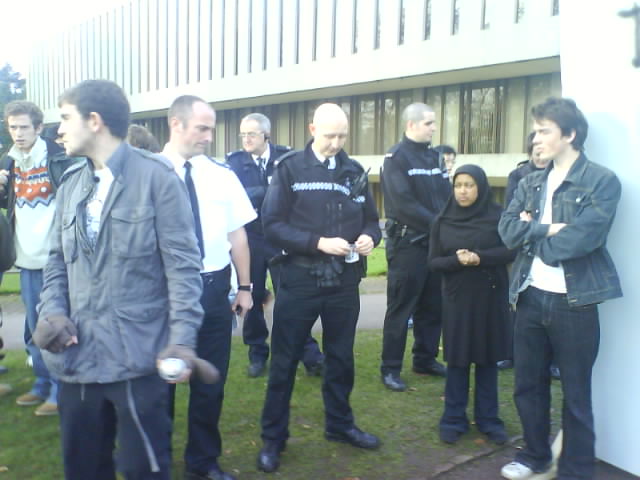Heavy Handed Police Condemned Over Peaceful Protest
Notts IMC | 04.12.2007 14:54 | Palestine | Repression
Nottinghamshire Police have been condemned for their heavy handed dealing with a peaceful protest which took place at Nottingham University. The protest, which was organized by students, occurred outside the Hallward Library on the University Park Campus, to raise awareness about the Israeli West Bank barrier, aka 'the wall'. A mock wall was constructed and spray-painted with slogans and images.
After Nottingham Uni security failed to 'apprehend' the situation, the police were called. This resulted in the threat of arrest to a number of students. For 'breach of the peace', 'assaulting a police officer', 'filming a police officer'(!), obstructing a police officer and obstruction of the highway. One student was arrested to 'apprehend a breach of the peace'. The wall was dismantled (rather symbolic given the context) and moved on after about half an hour.
Links: Arrest at Nottingham Uni over Palestine Protest | Notts Indymedia Palestine page
Audio: This Week In Palestine – Week 48 | Week 47 | Week 46 | Full audio archive
Previous protests: Starbucks Not Welcome at University | Nottingham University Student Die-In :: to protest at ethical investments | 'Die-in' at Nottingham University to protest at unethical investments | Protests as arms dealers attend careersfair

Police arrive
The view from the Students Union
Nottingham Students Union President, Gerald Bates, wrote in a response to a student who filmed the protest, that University authorities had been informed in advance about the protest, and that permission to erect the wall had been denied because "it was feared that this would be an intimidating presence to members of the student body." He continued "Nonetheless they erected this 'wall' and, as predicted, this caused much consternation among elements of the student body who have every right to be able to use a core University service without fear of intimidation." According to Bates, when requested to dismantle the wall by University Security they refused and the police were called in "to calm the situation down". In response "[a]ll the organisers agreed to this with the exception of one who was arrested for a 'breach of the peace'."
Bates concludes that "although all of our students have a fundamental right to express their views this should not be done in a way which would reasonably be expected to intimidate other members of our community. In this particular case it was deemed that the nature of the protest breached this and that is why the University deemed it necessary to intervene."
The protestor's view
However, according to a a law student who was present on the day "with regards the arrestee, he was not causing, or about to cause, a breach of the peace, but that is a legal issue where the police are at fault... Of course, had the police not been called, they would not have made this error and subjected him to arrest."
He continues that "[i]t is my opinion that the presence of the police turned the situation into a much confrontational one; such is the nature of police involvement. On this point, the police threatened me with arrest a number of times and on a number of different (and fortunately, incorrect) grounds, despite the fact that I made it known that I was merely their [sic] as an observer. I felt particularly intimidated and was worried that I would be reprimanded having not even been involved. I feel that this perfectly illustrates how the mere presence of the police can very quickly escalate an otherwise peaceful situation. I would certainly dispute the idea that a police presence was needed to ‘calm the situation down’!"
"The students were protesting peacefully, and made that intention very clear to all present; they were certainly not causing any intimidation and did not confront any of the discontented students in any way. Obviously it did provoke such discontent, but a protest is always going to be in confrontation with another’s beliefs... It is my judgment that the erection of ‘the wall’ was no more offensive by this definition than the fliers that were distributed, or a stall raising the same issues. It is with this in mind that I believe it was not a mere restriction on the method of exercise of their free speech, but a much more general restriction on the method of exercise which greatly restricted their ability to effectively express their beliefs."
Notts IMC
Comments
Display the following 2 comments